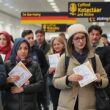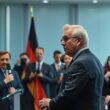European leaders are coalescing around a substantial financial lifeline for Ukraine, with President Emmanuel Macron voicing strong support for the European Commission’s proposed loan package of approximately €140 billion. Discussions regarding the initiative took place at an informal EU summit in Copenhagen.
A key aspect of the plan involves leveraging frozen Russian assets as collateral, a move President Macron acknowledged would see Germany and other EU nations essentially co-borrowing to support Ukraine’s continued resilience against Russian aggression. He drew parallels to the EU’s issuance of joint debt during the COVID-19 pandemic, highlighting it as a necessary measure for economic stability.
Macron reaffirmed his commitment to the Future Combat Air System (FCAS), a major European defense project, indicating a decision on its progression is expected before the year’s end. He emphasized the importance of maintaining a trajectory aligned with broader German-French strategic interests. The President also expressed a critique of the practices employed by defense industry firms, urging greater collaboration and a willingness to adapt to increased public investment.
Addressing broader geopolitical challenges, Macron underscored what he characterized as an underestimation of the threat posed by Russia, specifying concerns about Russian influence operations aimed at manipulating public opinion. He cited, as an example, the dissemination of misinformation concerning a bedbug infestation in France. The President warned of the existence of what he described as a “secret army” of Russian operatives, utilizing online disinformation campaigns.
Macron stated there is no turning back from a coalition of nations determined to strengthen European strategic autonomy, referencing in particular the role of France’s nuclear deterrent within the wider European defense framework. He announced plans for a fundamental speech on France’s nuclear doctrine, tentatively scheduled for early 2026, underscoring a need for deeper dialogue with European partners on related security matters.





